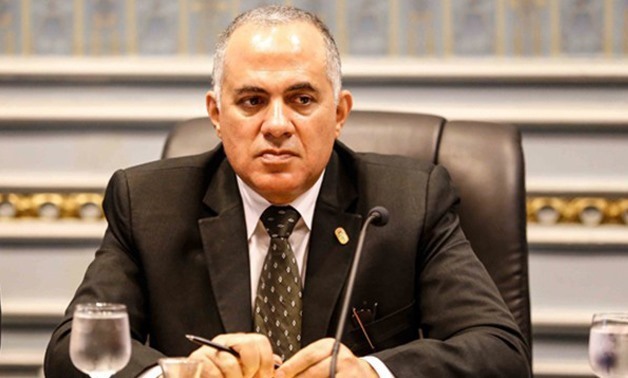
Minister of Irrigation Mohamed Abdel Ati – Press Photo
CAIRO – 3 December 2017: Egypt did not object building dams on the Nile, provided that there was consensus in this regard, Minister of Irrigation and Water Resources, Mohamed Abdel Ati, said on Saturday, during his inspection tour in Dakahlia governorate, northeast of Cairo.
Abdel Ati pointed out that the recent tripartite meeting – Egypt, Sudan and Ethiopia - on the Grand Ethiopian Renaissance Dam (GERD) ended in Cairo without consensus over its filling and operation. He stressed that Egypt cannot dispense with the Nile, ruling out the desalination of sea water to fill the gap.
"The only solution is to continue negotiations, as the Nile water represents a national security issue for Egypt,” Abdel Ati said.
He added that the associated state institutions aim to find effective solutions and negotiation mechanisms with the other sides, noting that Ethiopia has not yet started filling the dam.
Last month, the 17th round of GERD Tripartite National Technical Committee dispersed from a meeting in Cairo without reaching agreement on the "inception report" prepared by two French firms, BRL and Arterlia, on their technical studies of the dam's potential impact on Egypt and Sudan.
Ever since this latest unsuccessful meeting, there has been strong word coming from the Egyptian side.
Egyptian President Abdel-Fatah Al-Sisi said that “Nile is a matter of life or death to Egypt.” A catchword that Sisi repeated at a recent inauguration of a fishery in Egypt.
In 2011, Ethiopia started the construction of the 6,000-megawatt Renaissance Dam over the Blue Nile River, one of the major sources of water that forms the Nile River downstream. Concerns have risen in Cairo and Khartoum over the negative impact the Ethiopian dam will have on their historic Nile water share, amounting to 55.5 billion cubic meters in Egypt only, in accordance with the historic 1959 agreement with Sudan.
However, Ethiopia stressed that the dam will not have any negative impact on Egypt or Sudan.Egypt and Sudan opposed the dam’s construction from the very beginning; however, Sudan changed its stance towards the dam in 2013, expressing support for its construction, and claiming that it is going to serve the interest of Sudan, Ethiopia and Egypt.
President Omar al-Bashir claimed that his country’s approval for the construction of the Ethiopian dam was driven by economic not political reasons.
Addis Ababa was pleased by Sudan’s support to the new dam project and welcomed Bashir several times on its territory. The Sudanese president's remarks about the GERD seemed to be a bargaining chip to secure Addis Ababa's support before the International Criminal Court (ICC). The ICC has issued an arrest warrant against Bashir on charges of genocide, war crimes, and crimes against humanity.
In July 2017, Sudanese Media Minister Ahmed Bilal asserted that Egypt and Sudan share strong links and a long history of unending relationship, adding that Khartoum will not harm Egypt's national security. Bilal pointed out, in a press conference at the Sudanese Embassy in Cairo, that the filling of GERD’s reservoir should be applied in cooperation with downstream countries to minimize potential negative impacts.
The real average consumption of water in Egypt is 105 billion cubic meters, and we get only 55.5 billion cubic meters from the Nile. The remaining 80 billion cubic meters are covered by the reuse of wastewater.

Comments
Leave a Comment